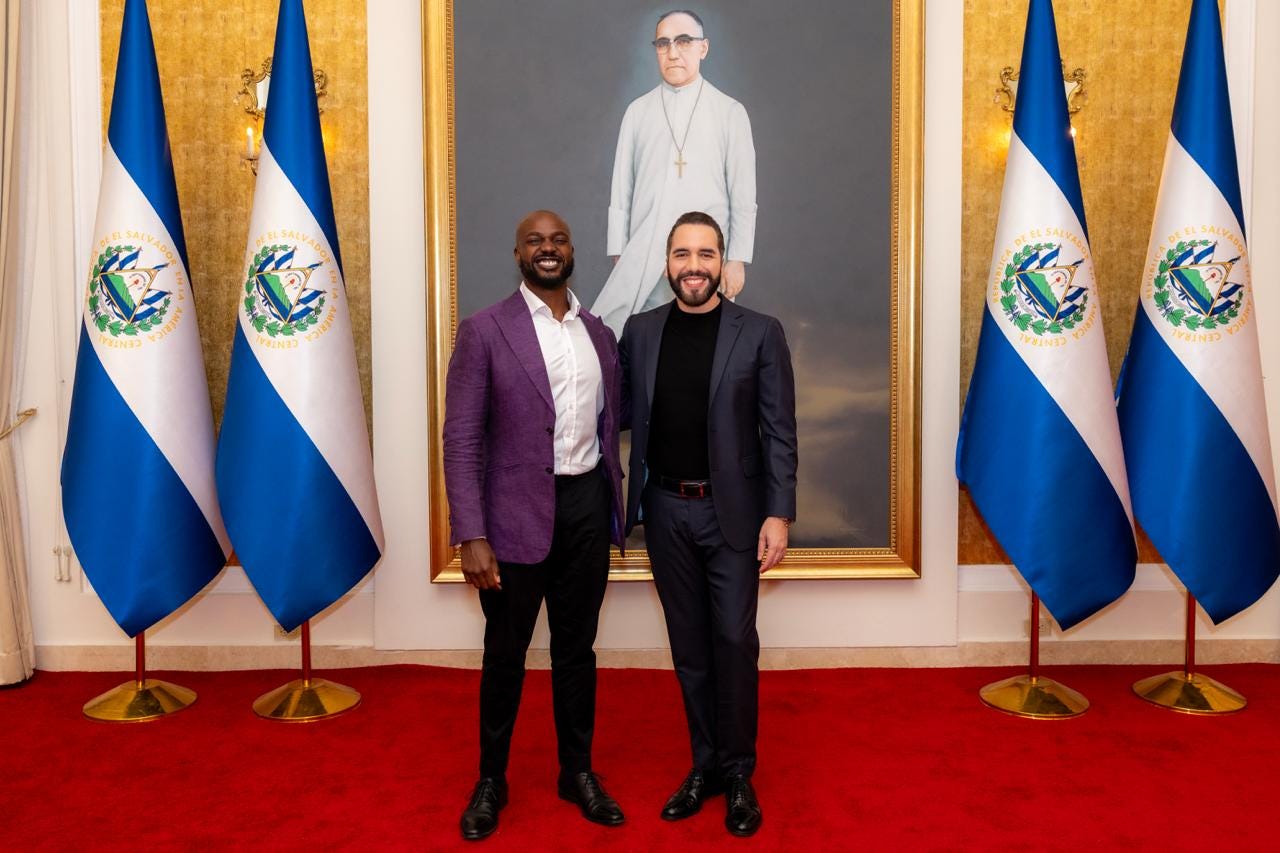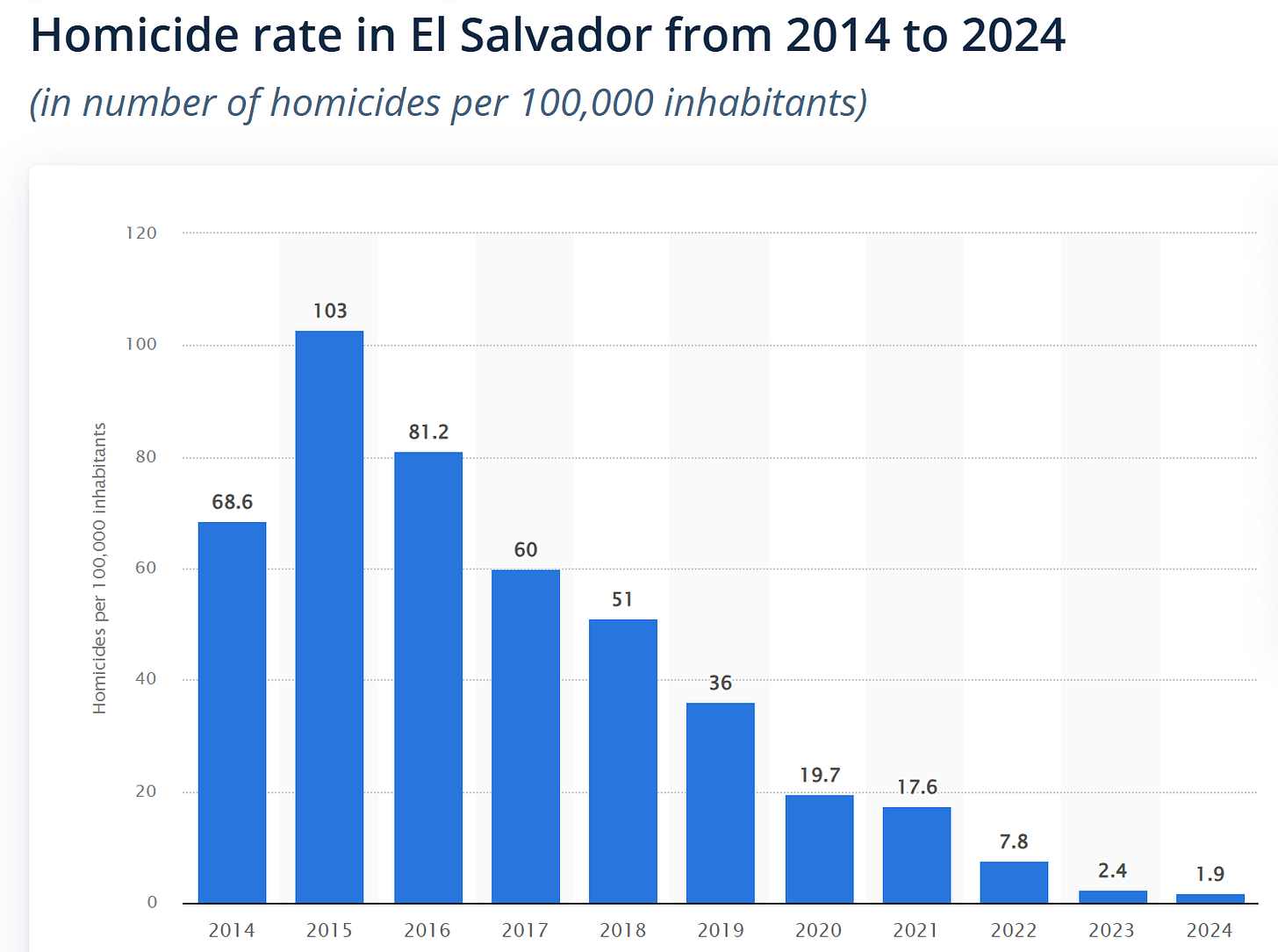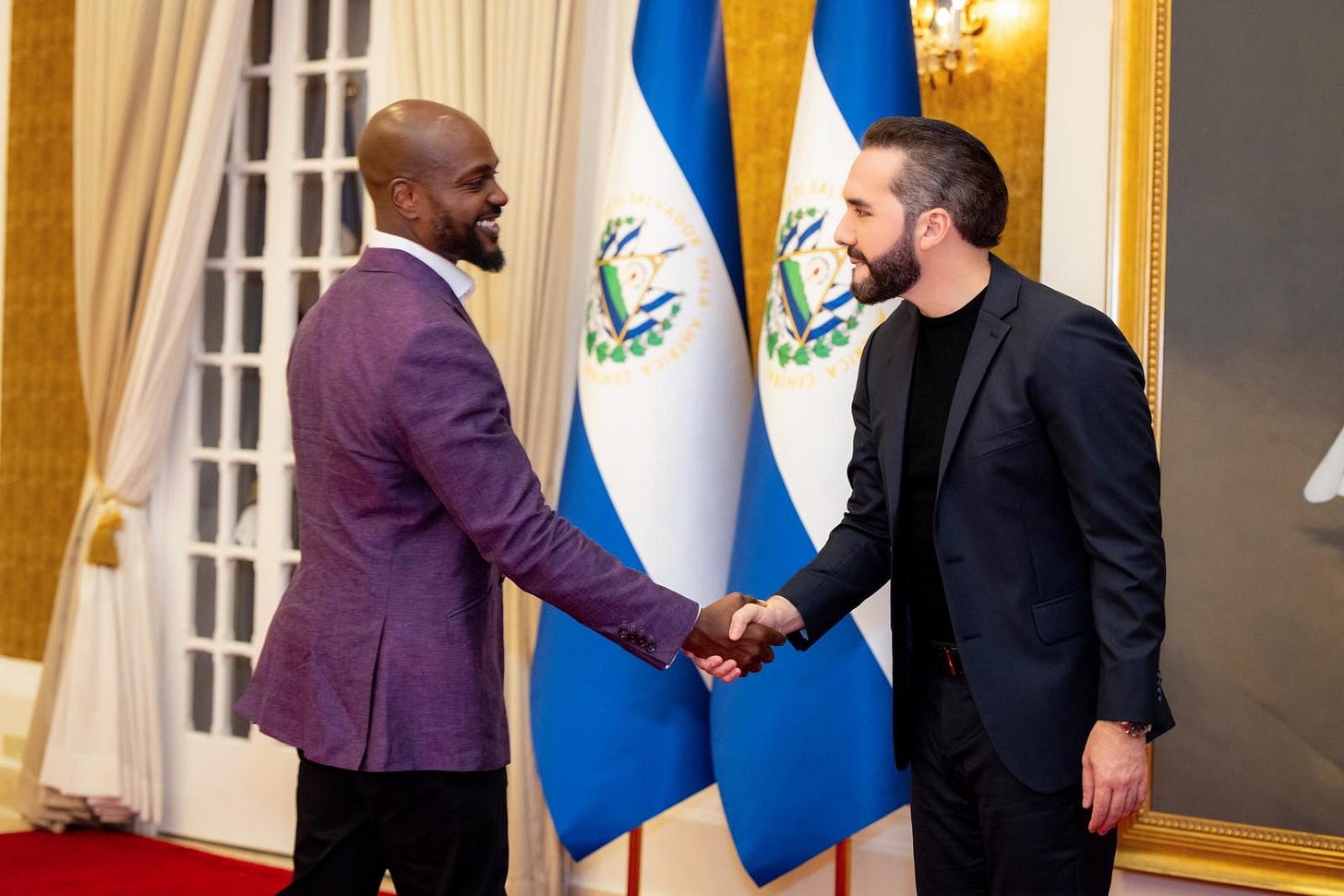How the 'Murder Capital' Became the Safest Country in the Americas
4 lessons from El Salvador
I recently visited El Salvador for the second time. Last year, I attended the presidential inauguration. This year, I was invited to speak at Bitcoin Histórico, an event hosted by the National Bitcoin Office.
Once again, I had a fantastic time there. It was great to connect with fellow bitcoin enthusiasts and to share a message of hope and inspiration with everybody who attended, which included both locals and visitors from around the world, like myself.
I even had the honour of being invited to a dinner with the President of El Salvador, Nayib Bukele, at the Presidential Palace (their equivalent of The White House).
El Salvador is a beautiful country with lush greenery, pristine beaches, and impressive volcanoes. The locals are friendly and the energy is generally positive.
The country still has a long way to go in terms of its economy and infrastructure. The GDP per capita is only around $6,000 USD and there is obvious, visible poverty. The average Salvadoran is not living it up, materially.
But with that said, I find this small, understated nation to be one of the most optimistic and inspiring on earth.
There is a lot that can be learned from El Salvador, its recent transformation, and its current trajectory. Here are four lessons that stand out to me:
1. Don’t let 1% of people terrorise the other 99%
El Salvador infamously used to hold the title of the ‘murder capital of the world’.
Through the 1990s to mid-2010s, it topped the global rankings several times for having the highest homicide rate of any country. Some years, it surged above 100 murders per 100,000 people.
As recently as 2016, the capital of San Salvador ranked as the most dangerous city in the world, with a homicide rate of over 130 per 100,000 people. For reference, that’s about 2-3x the homicide rate of Kingston, Jamaica and St. Louis, Missouri and 6x higher than Chicago, Illinois.
Most of this bloodshed was perpetrated by gang members (‘maras’), with the notorious street gangs MS-13 and Barrio 18 being largely responsible.
Fast forward to today, El Salvador ranks as arguably the safest country in the Western hemisphere. The homicide rate in 2024 was only 1.9 per 100,000 people, a figure comparable to Canada. 2025 looks on track to be even lower.
This represents a greater than 98% drop in homicide rate between 2016 and 2024.
How was this ‘impossible’ feat achieved?
Simple. Mostly by imprisoning violent criminals and keeping them locked up, away from polite society.
Naturally, Western media and bleeding-heart foreigners have been quick to scream about ‘human rights’ following the incarceration of thousands of known gang members (most with gang names and symbols tattooed all over their faces and bodies).
Interestingly, these same people were not concerned about ‘human rights’ when dozens of innocent Salvadorans were being brutally murdered every week, for decades on end.
However, despite the luxury beliefs of unaffected foreigners, most of the citizens of El Salvador are pleased with the result. President Nayib Bukele has maintained an approval rating in the 85-92% range since taking power (the highest of any world leader). Every day Salvadorans appreciate being able to walk outside safely at all hours, travel between cities, and send their kids to school without a reasonable fear that they won’t make it home alive.
“He who spares the wolf sacrifices the sheep.”
If any innocent person has been unjustly imprisoned (which is almost certain given the sheer scale of the arrests), then I hope they are freed, quickly. That is a valid concern.
But the general principle remains and the results speak for themselves. The tough-on-crime measures have been a massive win for safety and security of the country. The stage is now set for improvements everywhere else.
2. Teach kids about money
El Salvador is the only country I’m aware of that is teaching young children about money in its public schools through the Mi Nueva Escuela (My New School) reforms. Kids are learning about the history of money, inflation and its impacts, saving and investing, and bitcoin and the future of money. High school students can also earn a ‘Bitcoin diploma’.
In most countries, children don’t learn anything about money in school. Only those lucky enough to have financially-astute parents or mentors reach adulthood with an understanding of the basics.
Understanding money is a crucial skill that most people never gain, even as adults. We all use money in our daily lives, yet few understand it at a fundamental level. It can’t be a mere oversight that it is not taught in schools… but I’ll save that conspiracy for another time.
Teaching young people about money is a massive win for the future of the nation. If other leaders embraced this idea then within a generation or two, they’d have a far more financially-savvy and responsible citizenry, instead of a new wave of debt slaves.
This scheme is a sign to me that El Salvador is genuinely trying to equip its younger generations with the skills and knowledge they’ll need to be more successful than those that came before them. Another win.
3. Invest in the future
The government of El Salvador has been buying 1 bitcoin per day since 2022, and after a recent $100m USD purchase, they currently hold over 7,400 BTC in their national strategic reserve.
If bitcoin goes on to do what I believe it will do, then this could be worth the equivalent of hundreds of billions of dollars in the future. While other countries accumulate enormous debt due to short-term thinking and corruption, El Salvador is focused on accumulating the hardest form of money ever created. That’s visionary. So visionary in fact, that it will take at least a decade for most people to understand how prudent this decision was.
El Salvador was the first country to make bitcoin legal tender in 2021. Although it’s no longer mandatory, many businesses across the nation continue to accept bitcoin transactions. As inflation continues to eat away at the US dollar and every other fiat currency, bitcoin adoption is a long-term bet in a world that encourages short-term thinking from every angle.
Recently, El Salvador has also been investing heavily into healthcare technology and artificial intelligence. I don’t know all of the details and cannot predict how this will play out, but it’s another example of the government being willing to innovate and invest in areas that will make the country and its people more sovereign.
In most countries, people have grown accustomed to the government being apathetic to their needs at best, or actively working against them at worst. From what I can see (and anecdotal reports on the ground), the government of El Salvador is trying to do the opposite.
4. Ignore the outside noise
President Bukele and his administration have come under heavy criticism from foreign media outlets (and left-wingers in general) over the past few years. He has been labeled a ‘dictator’, ‘authoritarian’, ‘tyrant’, and of course, ‘a threat to democracy’.
While it’s prudent to always be vigilant about government overreach and potential human rights abuses, we should also use reason and just scales. As I mentioned before, very few of these vocal critics expressed concerns for the people of El Salvador when they were being terrorised and extorted by gangsters for decades. They didn’t care when one person was being murdered per hour in a country of only 6 million people.
They are not impressed by a 95%+ drop in murders, yet they are extremely concerned about how the murderers are being treated. Unfortunately, no systems or methods are perfect. The more extreme the situation, the more likely that a heavy-handed approach is needed to rectify it. And having the highest murder rate on the planet was certainly an extreme situation.
Having visited the country twice and spoken to locals, the vast majority are pleased with the increased security they now enjoy. And to be frank, I sympathise with them infinitely more than I sympathise with those who made their lives hellish for so many years.
For those of us who have never had to live in the ‘murder capital of the world’, it’s easy to take basic safety for granted. It’s easy to point out imperfections and express liberal concerns from a distance. And to be fair, as time goes on we’ll see just how valid these concerns are. Again, no system is perfect, but that doesn’t mean we should lose sight of the progress.
At a minimum, President Bukele has proven that cities, states, and nations can fix their seemingly ‘impossible’ problems. But it requires courage and an unwillingness to bow to criticism from ‘intellectuals’ and the media class, who have no skin in the game.
Nobody is above criticism. At the same time, people’s utopian visions will never be satisfied. And no nation can fix ALL of its problems in just a few years, no matter how excellent the leadership. The biggest problems should be addressed first.
I’m rooting for the citizens of El Salvador because I’m rooting for humanity. If you are a decent, law-abiding person, anywhere in the world, then I want you to win.
I hope that President Bukele and his administration continue to maintain security and make some serious headway into building out infrastructure and the economy in a sustainable way. It’s difficult, but possible.
I pray that El Salvador and other economically developing countries will come into their full glory in the 21st century. That would be very good for the world.
And I hope that larger, more developed nations aren’t too prideful to recognise that they can also be inspired and learn things from their smaller neighbours.
Viva El Salvador!
1,
Zuby






Sick suit, Zuby! Love that about you that you found your own colour!
Amazing turnaround for this country! I had no idea. Thanks for educating me on this success story.